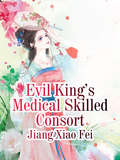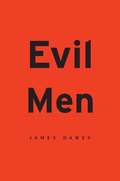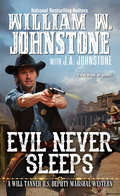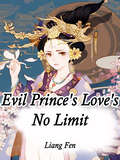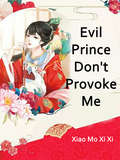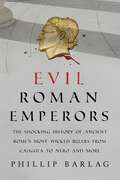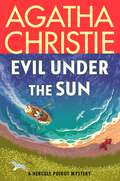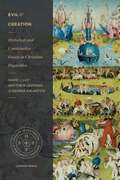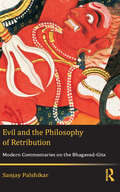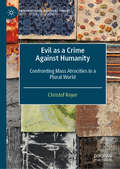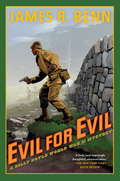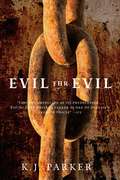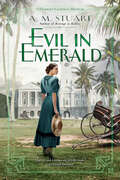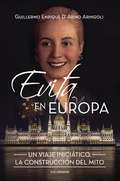- Table View
- List View
Evil King’s Medical Skilled Consort: Volume 7 (Volume 7 #7)
by Wang XiaoFeiOn the day of the wedding, not only did the bridal sedan chair of his beloved not arrive, it was instead carried into the palace to celebrate for the old emperor. The old emperor passed away, the one in love stepped on her to succeed the throne. As the Conspiracy Consort, her limbs and veins were all cut off by aphrodisiac, and she was buried in the Tomb of the Underground Emperor! In exchange for her death, all the chickens and dogs in the world would be raised to the heavens!When she woke up again, time had flowed back to three years ago. She was still a weak girl, her father was kind and her mother was kind, her sister was cute, and the person in her heart was still a modest gentleman. Huo Mingzhu sneered from the bottom of her heart. All of the peaceful love and camaraderie was just an illusion. She had already lost her life and would never believe their flowery words again.
Evil King’s Medical Skilled Consort: Volume 8 (Volume 8 #8)
by Wang XiaoFeiOn the day of the wedding, not only did the bridal sedan chair of his beloved not arrive, it was instead carried into the palace to celebrate for the old emperor. The old emperor passed away, the one in love stepped on her to succeed the throne. As the Conspiracy Consort, her limbs and veins were all cut off by aphrodisiac, and she was buried in the Tomb of the Underground Emperor! In exchange for her death, all the chickens and dogs in the world would be raised to the heavens!When she woke up again, time had flowed back to three years ago. She was still a weak girl, her father was kind and her mother was kind, her sister was cute, and the person in her heart was still a modest gentleman. Huo Mingzhu sneered from the bottom of her heart. All of the peaceful love and camaraderie was just an illusion. She had already lost her life and would never believe their flowery words again.
Evil King’s Medical Skilled Consort: Volume 9 (Volume 9 #9)
by Wang XiaoFeiOn the day of the wedding, not only did the bridal sedan chair of his beloved not arrive, it was instead carried into the palace to celebrate for the old emperor. The old emperor passed away, the one in love stepped on her to succeed the throne. As the Conspiracy Consort, her limbs and veins were all cut off by aphrodisiac, and she was buried in the Tomb of the Underground Emperor! In exchange for her death, all the chickens and dogs in the world would be raised to the heavens!When she woke up again, time had flowed back to three years ago. She was still a weak girl, her father was kind and her mother was kind, her sister was cute, and the person in her heart was still a modest gentleman. Huo Mingzhu sneered from the bottom of her heart. All of the peaceful love and camaraderie was just an illusion. She had already lost her life and would never believe their flowery words again.
Evil Men
by James DawesA searching meditation on our all-too-human capacity for inhumanity, Evil Men confronts atrocity head-on-how it looks and feels, what motivates it, how it can be stopped. James Dawes’s unflinchingly honest account, drawing on firsthand interviews, is not just about the things Japanese war criminals did, but about what it means to befriend them.
Evil Never Sleeps (A Will Tanner Western #4)
by William W. Johnstone J.A. JohnstoneThe bestselling masters of the American West add a deadly new twist to the epic saga of U.S. Marshal Will Tanner. The hunter becomes the hunted . . . He&’s the most notorious cattle rustler in all of Texas. His name—Jebediah Cotton—strikes fear into the hearts of every rancher in the territory. So it&’s more than a little strange that someone would shoot Cotton&’s youngest son in the back. Whoever did it is either a coward, a fool, or a crazy man. Whoever did it must die. Even if he&’s a U.S. deputy marshal named Will Tanner . . . So begins not one, but two of the deadliest manhunts in frontier history. As Will Tanner sets off into Oklahoma Territory in pursuit of godless bank robber, Jebediah Cotton sends his five remaining sons and cold-blooded brother-in-law after him. Will has no idea he&’s being stalked. But when there are this many players in the game, a U.S. deputy marshal has two choices: kill them all or die trying . . . Praise for the novels of William W. Johnstone &“For most fans of the Western genre, there isn&’t a bet much surer than a book bearing the name Johnstone.&”—True West &“[A] rousing, two-fisted saga of the growing American frontier.&”—Publishers Weekly on Eyes of Eagles &“There&’s plenty of gunplay and fast-paced action as this old-time hero proves again that a steady eye and quick reflexes are the keys to survival on the Western frontier.&”—Curled Up with a Good Book on Dead Before Sundown
Evil Prince's Love's No Limit: Volume 1 (Volume 1 #1)
by Liang FenAfter five years of marriage, she had wholeheartedly helped him ascend to the throne. However, he had ended up with a broken stomach and a broken family. The moment she was reborn, she was actually brought back to six years ago! Her concubine sister framed her, her grandmother despised her, she and her mother went about their business step by step; the feuds between officials and women, the chaos in the palace, everything had not changed. In this life, she definitely wouldn't be lenient. She would bully, betray, and harm her … She was going to get everything back one by one, and not rest until she was dead! He had truly wrongly paid for it and no longer believed in men, but why did he suddenly have someone by his side? He was still shamelessly pestering her. Cold Pink's new book, "Simple Hands Shrouding the Sky: The Regent's Little Poison Consort" was a cheat. You can read it by clicking on the title.
Evil Prince's Love's No Limit: Volume 2 (Volume 2 #2)
by Liang FenAfter five years of marriage, she had wholeheartedly helped him ascend to the throne. However, he had ended up with a broken stomach and a broken family. The moment she was reborn, she was actually brought back to six years ago! Her concubine sister framed her, her grandmother despised her, she and her mother went about their business step by step; the feuds between officials and women, the chaos in the palace, everything had not changed. In this life, she definitely wouldn't be lenient. She would bully, betray, and harm her … She was going to get everything back one by one, and not rest until she was dead! He had truly wrongly paid for it and no longer believed in men, but why did he suddenly have someone by his side? He was still shamelessly pestering her. Cold Pink's new book, "Simple Hands Shrouding the Sky: The Regent's Little Poison Consort" was a cheat. You can read it by clicking on the title.
Evil Prince's Love's No Limit: Volume 3 (Volume 3 #3)
by Liang FenAfter five years of marriage, she had wholeheartedly helped him ascend to the throne. However, he had ended up with a broken stomach and a broken family. The moment she was reborn, she was actually brought back to six years ago! Her concubine sister framed her, her grandmother despised her, she and her mother went about their business step by step; the feuds between officials and women, the chaos in the palace, everything had not changed. In this life, she definitely wouldn't be lenient. She would bully, betray, and harm her … She was going to get everything back one by one, and not rest until she was dead! He had truly wrongly paid for it and no longer believed in men, but why did he suddenly have someone by his side? He was still shamelessly pestering her. Cold Pink's new book, "Simple Hands Shrouding the Sky: The Regent's Little Poison Consort" was a cheat. You can read it by clicking on the title.
Evil Prince's Love's No Limit: Volume 4 (Volume 4 #4)
by Liang FenAfter five years of marriage, she had wholeheartedly helped him ascend to the throne. However, he had ended up with a broken stomach and a broken family. The moment she was reborn, she was actually brought back to six years ago! Her concubine sister framed her, her grandmother despised her, she and her mother went about their business step by step; the feuds between officials and women, the chaos in the palace, everything had not changed. In this life, she definitely wouldn't be lenient. She would bully, betray, and harm her … She was going to get everything back one by one, and not rest until she was dead! He had truly wrongly paid for it and no longer believed in men, but why did he suddenly have someone by his side? He was still shamelessly pestering her. Cold Pink's new book, "Simple Hands Shrouding the Sky: The Regent's Little Poison Consort" was a cheat. You can read it by clicking on the title.
Evil Prince's Love's No Limit: Volume 5 (Volume 5 #5)
by Liang FenAfter five years of marriage, she had wholeheartedly helped him ascend to the throne. However, he had ended up with a broken stomach and a broken family. The moment she was reborn, she was actually brought back to six years ago! Her concubine sister framed her, her grandmother despised her, she and her mother went about their business step by step; the feuds between officials and women, the chaos in the palace, everything had not changed. In this life, she definitely wouldn't be lenient. She would bully, betray, and harm her … She was going to get everything back one by one, and not rest until she was dead! He had truly wrongly paid for it and no longer believed in men, but why did he suddenly have someone by his side? He was still shamelessly pestering her. Cold Pink's new book, "Simple Hands Shrouding the Sky: The Regent's Little Poison Consort" was a cheat. You can read it by clicking on the title.
Evil Prince's Love's No Limit: Volume 6 (Volume 6 #6)
by Liang FenAfter five years of marriage, she had wholeheartedly helped him ascend to the throne. However, he had ended up with a broken stomach and a broken family. The moment she was reborn, she was actually brought back to six years ago! Her concubine sister framed her, her grandmother despised her, she and her mother went about their business step by step; the feuds between officials and women, the chaos in the palace, everything had not changed. In this life, she definitely wouldn't be lenient. She would bully, betray, and harm her … She was going to get everything back one by one, and not rest until she was dead! He had truly wrongly paid for it and no longer believed in men, but why did he suddenly have someone by his side? He was still shamelessly pestering her. Cold Pink's new book, "Simple Hands Shrouding the Sky: The Regent's Little Poison Consort" was a cheat. You can read it by clicking on the title.
Evil Prince's Love's No Limit: Volume 7 (Volume 7 #7)
by Liang FenAfter five years of marriage, she had wholeheartedly helped him ascend to the throne. However, he had ended up with a broken stomach and a broken family. The moment she was reborn, she was actually brought back to six years ago! Her concubine sister framed her, her grandmother despised her, she and her mother went about their business step by step; the feuds between officials and women, the chaos in the palace, everything had not changed. In this life, she definitely wouldn't be lenient. She would bully, betray, and harm her … She was going to get everything back one by one, and not rest until she was dead! He had truly wrongly paid for it and no longer believed in men, but why did he suddenly have someone by his side? He was still shamelessly pestering her. Cold Pink's new book, "Simple Hands Shrouding the Sky: The Regent's Little Poison Consort" was a cheat. You can read it by clicking on the title.
Evil Prince's Love's No Limit: Volume 8 (Volume 8 #8)
by Liang FenAfter five years of marriage, she had wholeheartedly helped him ascend to the throne. However, he had ended up with a broken stomach and a broken family. The moment she was reborn, she was actually brought back to six years ago! Her concubine sister framed her, her grandmother despised her, she and her mother went about their business step by step; the feuds between officials and women, the chaos in the palace, everything had not changed. In this life, she definitely wouldn't be lenient. She would bully, betray, and harm her … She was going to get everything back one by one, and not rest until she was dead! He had truly wrongly paid for it and no longer believed in men, but why did he suddenly have someone by his side? He was still shamelessly pestering her. Cold Pink's new book, "Simple Hands Shrouding the Sky: The Regent's Little Poison Consort" was a cheat. You can read it by clicking on the title.
Evil Prince, Don't Provoke Me: Volume 3 (Volume 3 #3)
by Xiao MoxixiHe was originally a traitor to the country, and should have died in front of the Darkya Realm. He lost his memory and became a substitute wife, marrying him. On the night of their wedding, the man bent over to pinch her chin, his ruthless gaze containing a few hints of ridicule and coldness. He raised his eyebrows and chuckled, "What are you afraid of? Isn't that what you want? A woman who wants to capture him! " With a candle in his bridal room, he tore apart the beautiful red bridal dress she was wearing and stomped on the ground together with her dignity. Her unintentional survival had caused her to become embroiled in a bloody crisis, making her a debt of hatred. In order to let everyone around her live on in peace, she was willing to let him have their way, but her heart slowly sank! It was only when he personally poured that bowl of bitter abortion medicine into her mouth that she fell into despair. When the truth was revealed, she knelt in front of him, tears streaming down her face. Her frail eyes were filled with the bitterness of many years. "Let me go..." A piece of paper, cut off her love, but hooked up with his
Evil Prince, Don't Provoke Me: Volume 4 (Volume 4 #4)
by Xiao MoxixiHe was originally a traitor to the country, and should have died in front of the Darkya Realm. He lost his memory and became a substitute wife, marrying him. On the night of their wedding, the man bent over to pinch her chin, his ruthless gaze containing a few hints of ridicule and coldness. He raised his eyebrows and chuckled, "What are you afraid of? Isn't that what you want? A woman who wants to capture him! " With a candle in his bridal room, he tore apart the beautiful red bridal dress she was wearing and stomped on the ground together with her dignity. Her unintentional survival had caused her to become embroiled in a bloody crisis, making her a debt of hatred. In order to let everyone around her live on in peace, she was willing to let him have their way, but her heart slowly sank! It was only when he personally poured that bowl of bitter abortion medicine into her mouth that she fell into despair. When the truth was revealed, she knelt in front of him, tears streaming down her face. Her frail eyes were filled with the bitterness of many years. "Let me go..." A piece of paper, cut off her love, but hooked up with his
Evil Roman Emperors: The Shocking History of Ancient Rome's Most Wicked Rulers from Caligula to Nero and More
by Phillip BarlagNero fiddled while Rome burned. As catchy as that aphorism is, it&’s sadly untrue, even if it has a nice ring to it. The one thing Nero is well-known for is the one thing he actually didn&’t do. But fear not, the truth of his life, his rule and what he did with unrestrained power, is plenty weird, salacious and horrifying.And he is not alone. Roman history, from the very foundation of the city, is replete with people and stories that shock our modern sensibilities. Evil Roman Emperors puts the worst of Rome&’s rulers in one place and offers a review of their lives and a historical context for what made them into what they became. It concludes by ranking them, counting down to the worst ruler in Rome&’s long history. Lucius Tarquinius Suburbus called peace conferences with warring states, only to slaughter foreign leaders; Commodus sold offices of the empire to the highest bidder; Caligula demanded to be worshipped as a god, and marched troops all the way to the ocean simply to collect seashells as &“proof&” of their conquest; even the Roman Senate itself was made up of oppressors, exploiters, and murderers of all stripes. Author Phillip Barlag profiles a host of evil Roman rulers across the history of their empire, along with the faceless governing bodies that condoned and even carried out heinous acts.Roman history, deviant or otherwise, is a subject of endless fascination. What&’s never been done before is to look at the worst of the worst at the same time, comparing them side by side, and ranking them against one another. Until now.
Evil Under the Sun: A Hercule Poirot Mystery (Hercule Poirot Mysteries #23)
by Agatha ChristieArlena Stuart, the famous actress, is enjoying-like our favorite Belgian detective Hercule Poirot-a summer holiday on Smugglers' Island, and will become a common enough sight, sunbathing on the hot sands. Then one azure morning her beautiful bronzed body is discovered in an isolated cove, in the shade. She is dead, strangled. And Poirot, as luckless as ever when he attempts some down-time, will learn in the course of his investigation that nearly all the guests of this exclusive resort have some connection to Arlena. But who had the capacity and the motive to kill her?
Evil and Creation: Historical and Constructive Essays in Christian Dogmatics (Studies in Historical and Systematic Theology)
by Matthew Levering George Kalantzis David Luy"My help comes from the Lord, maker of heaven and earth." Evil is an intruder upon a world created by God and declared good. Scripture emphasizes this: laments are regularly juxtaposed with declarations of God as creator. But evil is not merely a problem for the doctrine of creation. Rather, the doctrine of creation provides a hopeful response to evil. In Evil and Creation, David J. Luy, Matthew Levering, and George Kalantzis collect essays investigating how the doctrine of creation relates to moral and physical evil. Essayists pursue philosophical and theological analyses of evil rather than neatly solving the problem of evil itself. Including contributions from Constantine Campbell, Paul Blowers, and Paul Gavrilyuk, this volume draws upon biblical and patristic voices to produce constructive theology, considering topics ranging from vanity in Ecclesiastes and its patristic interpreters to animal suffering. Readers will gain a broader appreciation of evil and how to faithfully respond to it as well as a renewed hope in God as creator and judge.
Evil and the Philosophy of Retribution: Modern Commentaries on the Bhagavad-Gita (100 Cases)
by Sanjay PalshikarWhat is ‘evil’? What are the ways of overcoming this destructive and morally recalcitrant phenomenon? To what extent is the use of punitive violence tenable? Evil and the Philosophy of Retribution compares the responses of three modern Indian commentators on the Bhagavad-Gita — Aurobindo Ghose, Bal Gangadhar Tilak and Mahatma Gandhi. The book reveals that some of the central themes in the Bhagavad-Gita were transformed by these intellectuals into categories of modern socio-political thought by reclaiming them from pre-modern debates on ritual and renunciation. Based on canonical texts, this work presents a fascinating account of how the relationship between ‘good’, ‘evil’ and retribution is construed against the backdrop of militant nationalism and the development of modern Hinduism. Amid competing constructions of Indian tradition as well as contemporary concerns, it traces the emerging representations of modern Hindu self-consciousness under colonialism, and its very understanding of evil surrounding a textual ethos. Replete with Sanskrit, English, Marathi, and Gujarati sources, this will especially interest scholars of modern Indian history, philosophy, political science, history of religion, and those interested in the Bhagavad-Gita.
Evil as a Crime Against Humanity: Confronting Mass Atrocities in a Plural World (International Political Theory)
by Christof RoyerThis book seeks to reimagine why and how to confront mass atrocities in world politics. Drawing on Hannah Arendt’s conception of evil, it interprets and understands mass atrocities as ‘evil’ in an ‘Arendtian’ sense, that is, as crimes against human plurality and, thus, crimes against humanity itself. This understanding of mass atrocities paves the way for reframing responses to mass atrocities as attempts to confront evil. In doing so, the book focuses on military intervention under the banner of the Responsibility to Protect (R2P) and judicial intervention by the International Criminal Court (ICC) and reframes them as tools to protect human plurality from evil. Furthermore, the book looks at the place and the role of R2P and the ICC in the changing landscape of world order. It argues that the protection of humanity from evil can serve as a legitimate Grundnorm (basic norm) around which a global constitutional order in an inherently pluralistic world can be constructed.
Evil for Evil (Billy Boyle World War II Mystery #4)
by James R. BennBenn continues to create fascinating behind-the-scenes mysteries from little-known facets of World War II history. . . . A fast-paced mix of action, adventure, and crime solving. --"Booklist. "
Evil for Evil (Engineer #2)
by K. J. ParkerCivitas Vadanis is in trouble. The Mezentines have declared war; and the Mezentines are very focused on their goals when it comes to killing. Duke Valens, of Civitas Vadanis, has a dilemma. He knows that his city cannot withstand the invading army; yet its walls are his only defence against the Mezentines. Perhaps the only way to save his people is to flee, but that will not be easy either. Ziani Vaatzes, an engineer exiled by the Mezentines for his abominable creations, has already proven that he can defend a city. But Ziani Vaatzes has his own concerns, and the fate of Civitas Vadanis may not be one of them.
Evil in Emerald (A Harriet Gordon Mystery #3)
by A.M. StuartCraving a change of pace, Harriet Gordon, joins a local musical theatre production but when a fellow cast member is brutally killed, Harriet and Inspector Curran must turn the spotlight on murder in this all-new mystery from the author of Revenge in Rubies. Between working at her brother&’s school and typing up Inspector Robert Curran&’s police reports, Harriet Gordon has little time for personal pursuits and she has been enjoying the rehearsals for her role in the Singapore Amateur Dramatic and Musical Society&’s latest production – Pirates of Penzance. But Harriet quickly discovers tensions run deep within the theatre company and when the leading man is found murdered, suspicions abound, exposing scandalous behavior as well as some insidious crimes. Inspector Curran once again turns to Harriet for help with this difficult case, but his own life begins to unravel as a mysterious man turns up on his doorstep claiming to know more about Curran&’s painful past than he himself does. And after the one person he has always counted on delivers him some devastating news, the line between his personal and professional life begins to blur. Now, more than ever, Curran needs Harriet&’s steadfast assistance, and when another cast member meets a violent end, Curran and Harriet will have to close in on a killer determined to make this case their final curtain call.
Evil of the Age: A Thriller
by Allan LevinePolitical corruption, abortion, and dead body discovered inside a trunk at Hudson depot.The summer of 1871 in New York City is hot and humid. The city is gripped by two seemingly separate events. The first is the discovery of a beautiful young woman's body stuffed inside a trunk at the Hudson railway depot. The second involves Victor Fowler, grand sachem of Tammany Hall, and the "Boss" of what is popularly referred to as "The Ring." This is a small clique that includes Governor "Dandy" Archibald Krupp, Fowler's man at the state assembly in Albany; Mayor Thomas "The Prince" Emery, an opportunist of the worst variety; "Slimy" Bob James, the cunning and sly city comptroller; and Isaac "The Wizard" Harrison, the City Chamberlain, who is possibly the most treacherous of the "Ring Rascals."In Evil of the Age, New York journalist Charles St. Clair, tracking down the story of Lucy Maloney, the "kept woman" found murdered and stuffed in a trunk at the Hudson railway depot, moves from the mansions of Fifth Avenue to the brothels of SoHo to the seedy and dangerous saloons on Water Street. St. Clair soon uncovers Lucy's connection to a ring of abortionists and to Madame Philippe, a wealthy woman who known as Madam Killer.St. Clair confronts Madame Philippe at the Tombs prison, where she awaits the hangman's noose for Lucy's murder. St. Clair believes her to be innocent and sets out to prove it, discovering deceit at the highest levels of political power and the shocking secret of the "Ring Rascals."
Evita en Europa: Un viaje iniciático. La construcción del mito
by Guillermo Enrique D'Arino AringoliComparte la aventura que trasformó a María Eva Duarte de Perón en un mito universal: EVITA. <P><P>La vida tan increíblemente cambiante y novelesca de la señora María Eva Duarte de Perón daría un giro fundamental, a principios de1947, cuando llega una invitación oficial del general Francisco Franco al general Juan Perón para que visite España, después de iniciada la ayuda material propiciada por el nuevo gobierno del presidente argentino. <P>Ella no dejaría pasar esta oportunidad. De este modo, con extrema audacia, y al mismo tiempo venciendo sus propios temores, acepta encabezar la gira diplomática por la castigada Europa posbélica. Así, con su frescura habitual, Eva repartirá billetes de cien pesetas a la muchedumbre que delira a su paso. <P>Esta «Gira del Arco Iris», el nombre oficial de la travesía, con sus desplazamientos duraría 78 días visitando España y también Italia, Portugal, Francia, Mónaco, Suiza, Brasil y Uruguay. Se convertirá en su viaje iniciático hasta alcanzar su verdadera transformación interior. <P> Eva volverá del viaje siendo otra. Se fue como la señora de Perón y volverá como Evita; un mito en construcción. La detallada crónica del periplo -poco conocido y estudiado- se enriquece con una serie de 70 fotografías seleccionadas con valor documental. La gira tuvo características que en el mundo de hoy resultarían insólitas. <P>En términos actuales, al finalizar el viaje, Evita se había convertido en una celebrity de alcance mundial.
